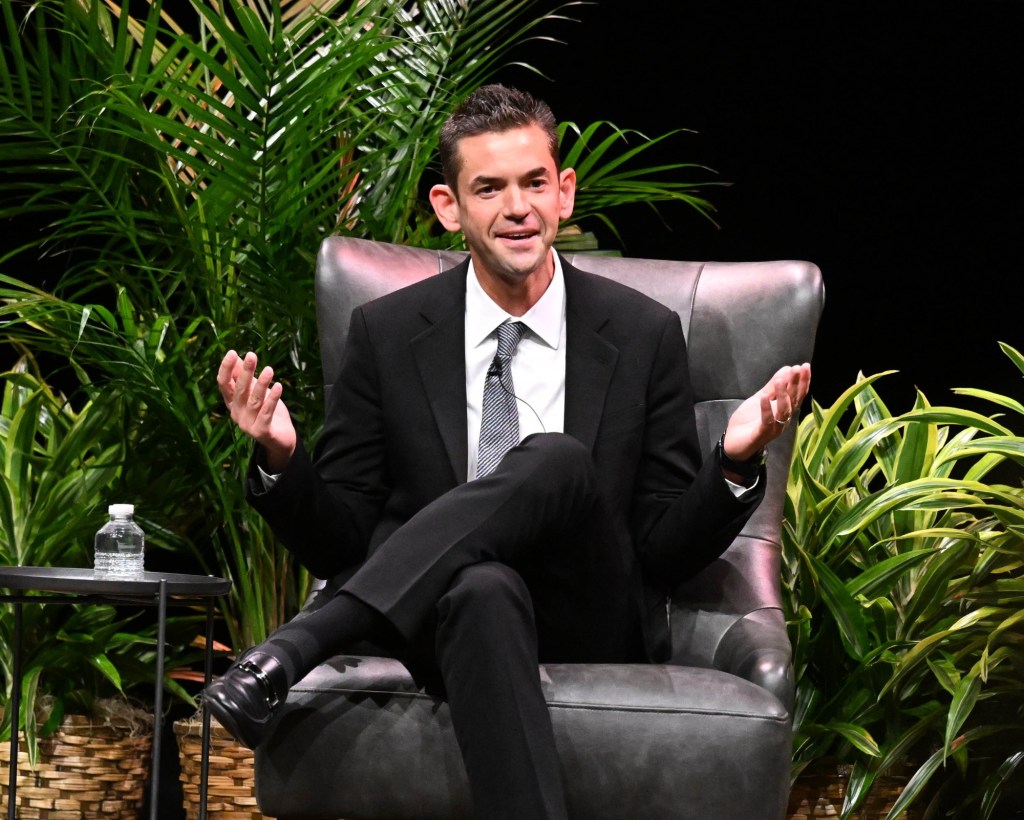Jared Isaacman had some advice for the students that filled the auditorium at Lehigh University’s Zoellner Arts Center on Tuesday evening.
“To be very clear for everyone in this room, I absolutely believe you should stick to the well-paved road of higher education,” he said. “It will certainly give you the most opportunities in life.”
It comes from someone who dropped out of high school to start what is now a successful payment processing company, Upper Saucon Township-based Shift4. He amassed a large personal fortune and followed his childhood dream to be an astronaut, collaborating with Elon Musk after buying his first chartered flight on SpaceX in 2021.
“A lot of things tend to go my way,” Isaacman, 42, said. “There was a lot of luck bouncing your way in order to wind up where I’ve been in life. I mean, leaving school early should not result in this kind of outcome.”
Isaacman, who lives in Northampton County with his family, passed out advice and discussed the future of space travel before members of the university community. He was the inaugural guest for Lehigh’s Future Makers Speaker Series.
Jared Isaacman, founder of Shift4 and Draken International, speaks Tuesday, Oct. 14, 2025, as part of the Future Makers speaker series at Lehigh University in Bethlehem. Isaacman performed the first private spacewalk in Sept. 2024 and was nominated by President Trump to lead NASA before the nomination was later withdrawn. (Amy Shortell/The Morning Call)
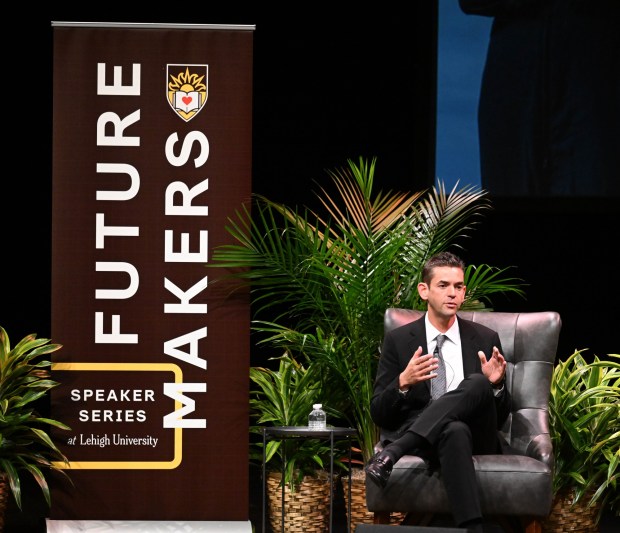
Jared Isaacman, founder of Shift4 and Draken International, speaks Tuesday, Oct. 14, 2025, as part of the Future Makers speaker series at Lehigh University in Bethlehem. Isaacman performed the first private spacewalk in Sept. 2024 and was nominated by President Trump to lead NASA before the nomination was later withdrawn. (Amy Shortell/The Morning Call)
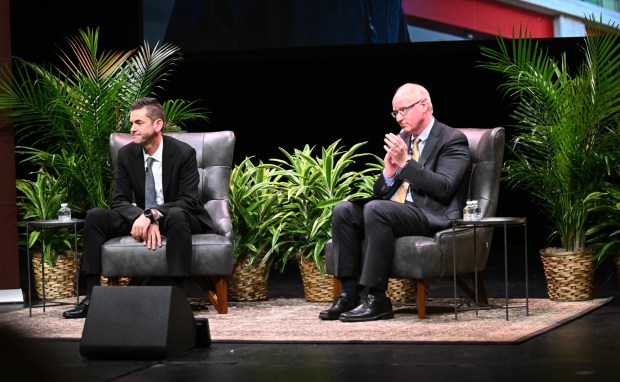
Jared Isaacman, founder of Shift4 and Draken International, speaks with Lehigh University Provost Nathan Urban Tuesday, Oct. 14, 2025, as part of the Future Makers speaker series at Lehigh University in Bethlehem. Isaacman performed the first private spacewalk in Sept. 2024 and was nominated by President Trump to lead NASA before the nomination was later withdrawn. (Amy Shortell/The Morning Call)
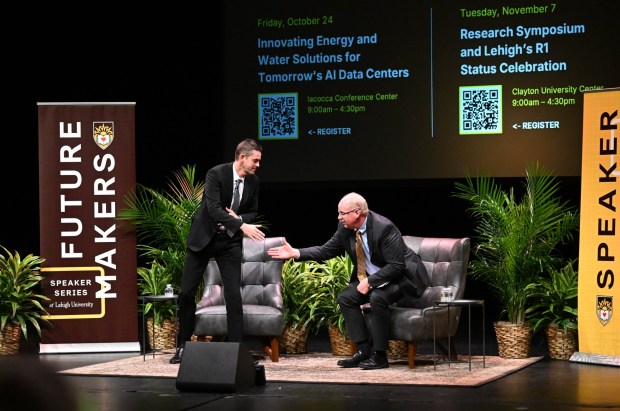
Jared Isaacman, founder of Shift4 and Draken International, speaks with Lehigh University Provost Nathan Urban Tuesday, Oct. 14, 2025, as part of the Future Makers speaker series at Lehigh University in Bethlehem. Isaacman performed the first private spacewalk in Sept. 2024 and was nominated by President Trump to lead NASA before the nomination was later withdrawn. (Amy Shortell/The Morning Call)
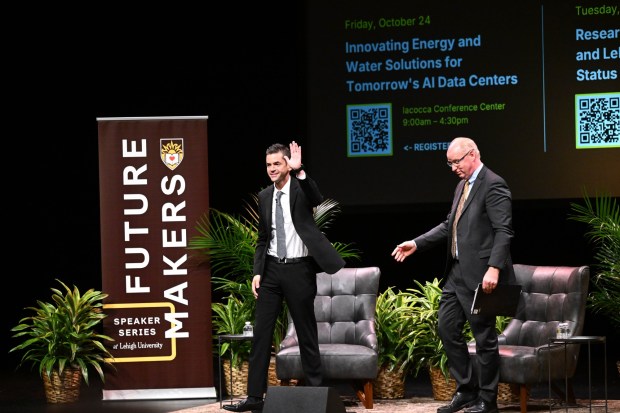
Jared Isaacman, founder of Shift4 and Draken International, speaks with Lehigh University Provost Nathan Urban Tuesday, Oct. 14, 2025, as part of the Future Makers speaker series at Lehigh University in Bethlehem. Isaacman performed the first private spacewalk in Sept. 2024 and was nominated by President Trump to lead NASA before the nomination was later withdrawn. (Amy Shortell/The Morning Call)
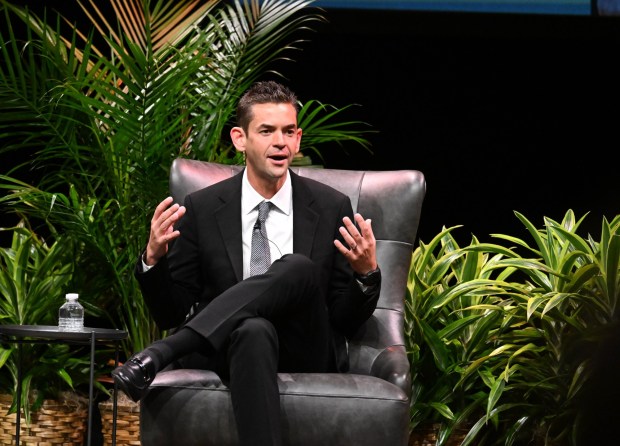
Jared Isaacman, founder of Shift4 and Draken International, speaks Tuesday, Oct. 14, 2025, as part of the Future Makers speaker series at Lehigh University in Bethlehem. Isaacman performed the first private spacewalk in Sept. 2024 and was nominated by President Trump to lead NASA before the nomination was later withdrawn. (Amy Shortell/The Morning Call)
Show Caption
1 of 6
Jared Isaacman, founder of Shift4 and Draken International, speaks Tuesday, Oct. 14, 2025, as part of the Future Makers speaker series at Lehigh University in Bethlehem. Isaacman performed the first private spacewalk in Sept. 2024 and was nominated by President Trump to lead NASA before the nomination was later withdrawn. (Amy Shortell/The Morning Call)
“If we want to inspire students, faculty and other members of our university and regional communities to make a better future, it’s important that we highlight examples of people who are doing or who have done this,” said university Provost and Senior Vice President of Academic Affairs Nathan Urban, who moderated the event. “People who through innovation, hard work and resilience, have played a role in making the future. People can help show the way to others.”
Isaacman was nominated to head NASA by President Donald Trump before his nomination was withdrawn in June. Shortly after that, he stepped down as CEO of Shift4, but remained as executive chairman. He also founded Draken International, a provider of tactical fighter aircraft for contract air services including military and defense industry customers.
Here are five takeaways from Isaacman’s 45-minute talk, which included questions from the audience:
‘Grounded in realty’
Isaacman has combined his passion for aviation and exploration with charitable giving. For instance, when he commanded SpaceX mission Inspiration4 in 2021, the flight raised more than $250 million for St. Jude Children’s Research Hospital, which included $100 million of his own money.
He reiterated his luck in life.
“I’m very grounded in reality,” Isaacman said. “I’ve been lucky in life. Really, you shouldn’t be out of school at 16 and have had any of the chances that I’ve been able to have experiences in life, such as sitting before the United States Senate.”
He said many talented people aren’t able to fulfill their dreams because of how their lives develop.
“Two philosophies I keep close to my heart are: I don’t think you fulfill your purpose in life if you don’t maximize the opportunities you’re lucky enough to receive, and, two, you have an obligation to the extent you can make the world a better place than you found it,” Isaacman said.
Just scratching the surface
Urban pointed out that the distance from the ground to space is 62 miles, shorter than the distance from Bethlehem to New York. With recent advances in technology, trips have become easier and more numerous.
“What do you see as the opportunities that are afforded to us, to us as a country, to us as a species, as our ability to go those 62 miles becomes so much easier and cheaper?” Urban asked.
Isaacman said part of the excitement of space exploration is that it’s so close “and we have not even begun to scratch the surface of what is the greatest adventure in human history.”
“My last mission to space, we were the farthest in space anyone’s gone since the last time we walked on, about 1,400 kilometers,”’ he said. “So it’s like, OK, so from here to Georgia, it’s really not that far. And yet it’s so damn hard to get there, and that was in a very large environment.”
He said he was disappointed as a child when he found out that there wasn’t much left to discover on Earth.
“There is so much to go out there [in space]. The closest we’ve gone is our neighbor, the moon. It is absolutely our destiny to go out and explore and discover. And what we will inevitably find along the way, will just completely alter the course of human history. It’s really exciting to think about.”
Paying for it
Isaacman said that the recent advances in space technology along with competition among businesses has made launching rockets cheaper.
“This is the healthiest time we have ever had in the history of the space program,” he said. “In the launch market, there are a lot of players, such as United Launch Alliance, which is a Boeing Lockheed joint venture. They got SpaceX, which is launching every two days. Every month and a half, they launch their big skyscraper that they’re working on, which is the fully reusable starship.”
He added that Blue Origin — which was founded by Jeff Bezos — is ready to launch its New Glenn rocket. There are also companies increasing their presence such as Stoke Space and Rocket Lab.
“We knew no other time in the history of human space where you can just rattle off so many names of companies that are building rockets, and that’s a good thing,” Isaacman said. “The more competition we have, the more it will drive innovation and bring down costs.”
NASA may get credit for getting man to the moon in 1969, he said, but it did it with help from corporations such as Boeing, Lockheed Martin and Northrop Grumman
“We can’t have this exciting future in space be entirely funded by taxpayers,” Isaacman said. “We need a total game-changing moment where cancer-fighting drugs or crystal formulations or mining asteroids. I don’t care what it is, we need to figure out that economy, that’s going to fund the future we all want in space, and space will truly go from the select few to the many.”
Space and life
Urban wondered if being in space changed Isaacman’s perspective on life.
He answered that it reinforced his belief that there’s a great opportunity to learn many new things.
“It’s an appreciation for how small we are in the grand scheme of things, and how exciting it must be what we may come to learn,” Isaacman said.
‘Obsess over decisions’
An audience member wanted to know what mindset Isaacman uses to perform.
“My approach is I try not to do a lot of thoughts,” he said. “I’m really concentrating on one or two things that I think can move the needle. And I try to give it as much of my attention as I can.”
He said it’s important to have a good plan that you review with lots of people.
“I obsess over decisions I make, especially the ones I got wrong,” Isaacman said. “I’ll go back and look at emails from 15 years earlier to understand what went into my decision making, then, versus now, and never stop trying to learn from it.
“The other thing is whatever journey you’re on where you will inevitably run into problems, issues, unexpected setbacks, or whatever the first step is figuring out whatever the hell you did to cause it. Bad leaders tend to look at the people around them instead of what they contributed to it. That kind of endless self reflection on the decision you made that either resulted in a good or bad outcome.”
Isaacman said start with yourself to see where the problem is to fix it.
Morning Call reporter Evan Jones can be reached at ejones@mcall.com.

